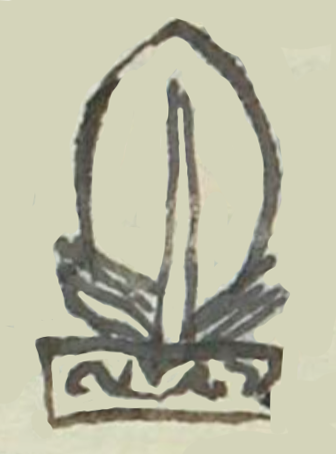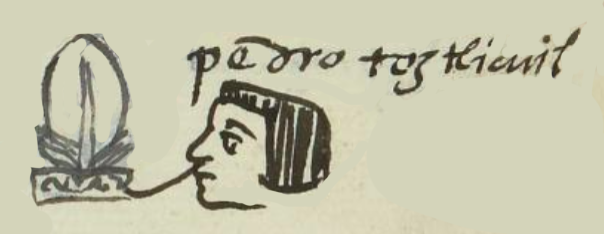Toztli Icuil (MH686v)
This black-line drawing of the simplex glyph for the personal name Toztli Icuil (perhaps “Yellow Parrot Writes,” attested here as a man’s name) shows a frontal view of a feather that must pertain to a Yellow-headed Amazon parrot (toztli). Below the feather is a small, horizontal rectangle that seems to be a piece of paper with symbolic alphabetic writing or a design. This must represent the “Icuil” part of the name, which seems to be short for icuiloa, to write or paint.
Stephanie Wood
This glyph was painted over a different glyph, which must have been a mistake, because it was painted over in white–while still being somewhat visible. Folio 498 verso of this same manuscript has another glyph for this same name. In that example (below) the feather has three scrolls coming up from its base.
Marc Thouvenot identifies the verb icuiloa (or ihcuiloa, with the glottal stop), which means to paint, write, or print, as having a root of -cuil-. He notes how it also appears in tlacuiloliztli (writing), tlacuilo (writer), and cuicuiltic (mottled). He goes on to show various uses of icuiloa that take it beyond the simple definitions just given, resulting in something like the action of creating a design (e.g., on leather, ceramics, sculpture, or in textiles). It can also be something like the action of decorating (e.g., to put a flower on a cup of atole). He associates icuiloa and tlacuilolli with "cultural artifacts," such as arts and crafts or examples of writing and painting, but cuicuiltic with effects created by "nature." This short summary barely does his article justice; it is worth reading the entire piece. How Thouvenot's study might connect with the concept of bent or curved mentioned by Prem (1974: 555, 682) raises an interesting question. Perhaps the bent or curved lines of writing, painting, carving, embroidery, and so on, fall with in the realm of expressions of -cuil-. See
Marc Thouvenot, "Imágenes y escritura entre los nahuas del inicio del XVI," Estudios de Cultural Náhuatl 41 (2010).
Stephanie Wood
pedro toztlicuil
Pedro Toztli Icuil
Stephanie Wood & Jeff Haskett-Wood
1560
Jeff Haskett-Wood
pájaros, loros, plumas, escritura, papel, diseños, nombres de hombres

toz(tli), Yellow-headed Amazon parrot, https://nahuatl.wired-humanities.org/content/toztli
icuiloa, to write or paint, https://nahuatl.wired-humanities.org/content/icuiloa
Loro Amarillo Que Escribe
Stephanie Wood
Matrícula de Huexotzinco, folio 686v, World Digital Library, https://www.loc.gov/resource/gdcwdl.wdl_15282/?sp=453&st=image.
This manuscript is hosted by the Library of Congress and the World Digital Library; used here with the Creative Commons, “Attribution-NonCommercial-ShareAlike 3.0 License” (CC-BY-NC-SAq 3.0).






